Existing User Log In
New User Registration
Register for a free account to gain full access to the VGChartz Network and join our thriving community.



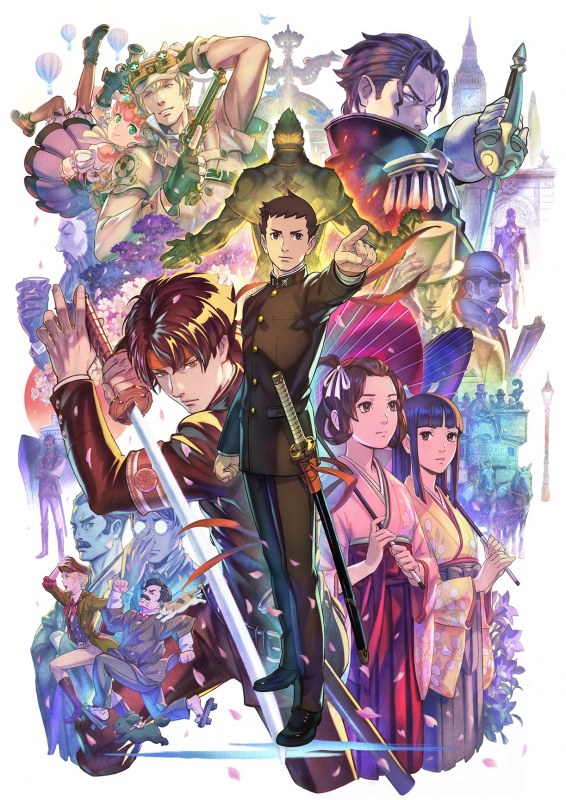

America - Front
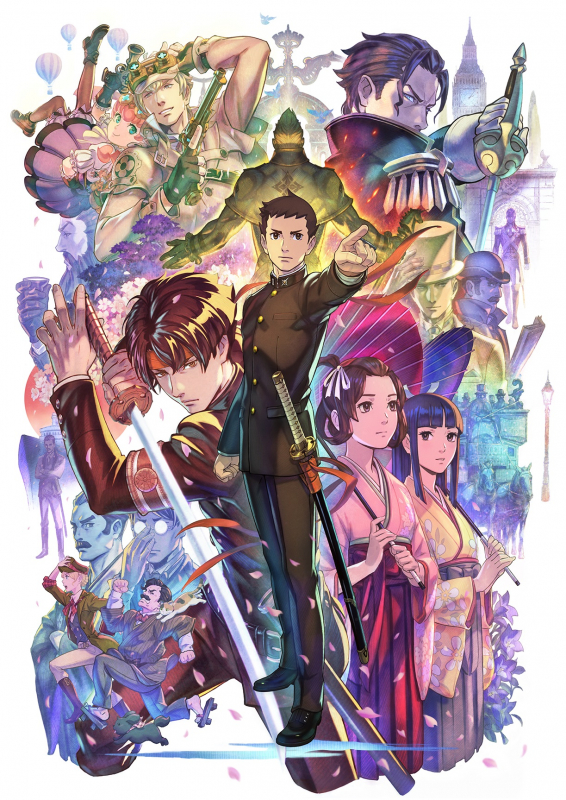

America - Back

Capcom
Adventure
 (Add Date)
(Add Date) (Add Date)
(Add Date) (Add Date)
(Add Date)
| Owners: | 0 |
| Favorite: | 0 |
| Tracked: | 0 |
| Wishlist: | 0 |
| Now Playing: | 0 |
Spare a thought for the employees at Capcom who are responsible for trying to market the Ace Attorney series. Making the prospect of “spend ten hours in a courtroom and another ten hours supervising underage girls around crime scenes” sound appealing can’t be easy. Despite the inherent difficulty of the pitch, Ace Attorney games have always been wildly entertaining for me. A big part of that is the unique cast of characters they’ve built up over the years and getting to watch them interact with each other. So here comes the newest entry, which immediately proceeds to ditch all of those interesting characters and start the slate brand spanking new.
Well perhaps that’s not entirely true; The Great Ace Attorney Chronicles is still set in the same universe, but only a mere ~130 years prior to the mainline entries, featuring Phoenix Wright’s Japanese ancestor solving a series of cases in Victorian era Britain (and good freaking luck to the Capcom localization team trying to explain how totally American Phoenix Wright is in the next mainline title after this). Great Ace Attorney is actually two games compiled into a single set for localization purposes, and as such carries some interesting intricacies.
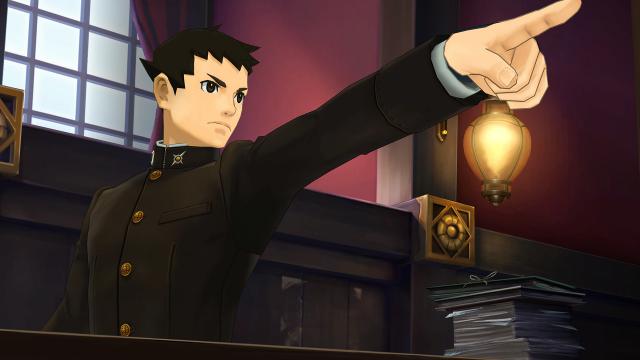
If you’re not familiar with Ace Attorney, it’s a virtual novel series focusing around legal cases that very obviously doesn’t know how court proceedings actually work. You play as one of a handful of defense attorneys, who inevitably find themselves tasked with representing a defendant who has been accused of murder (and even when it’s not murder initially, it winds up being murder later on). Being visual novels, the bulk of each one consists of reading, but I don’t consider that necessarily a bad thing, because Ace Attorney bases its core gameplay around player attentiveness. You need to be making mental notes at every juncture, be it while investigating crime scenes or actually defending the client in the courtroom, so that you can present the proper evidence and ask the correct questions when necessary.
If you are familiar with Ace Attorney then you pretty much know how Great Ace Attorney works. For the most part, it’s the same two-part blend of crime scene investigations and trial segments. Find evidence and talk to witnesses in the former, present said evidence and cross examine said witnesses in the latter. And that’s not terribly surprising; Ace Attorney has by and large used the same formula for the better part of 20 years now.
Perhaps that’s not inherently a bad thing; visual novels tend to live or die on the quality of their writing much moreso than making any sort of significant gameplay evolution. And, indeed, the writing in Great Ace Attorney is quite good. The main characters are likeable and fun to be around, the dialogue is snappy and well-written, and the overarching plot does a good job of driving events and keeping players invested, even if it does feel like it takes a long time for things to really get going in the first of the two games included. The storytelling here is certainly far above par for your average video game.
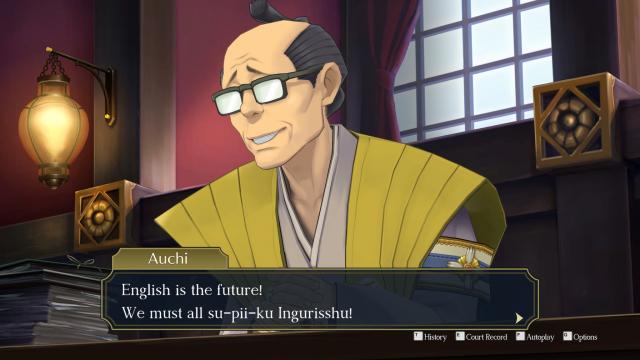
The supporting cast also lives up to its billing as well. Perhaps the biggest selling point for Great Ace Attorney is the presence of Sherlock Holmes (or “Herlock Sholmes” as the game writes it to avoid copyright issues). Sholmes is genuinely one of the most entertaining supporting characters in an Ace Attorney game, and his assistant, Iris Watson, isn’t far behind. The usual cast of witnesses and tertiary characters is also pretty engaging, especially thief-turned-detective Gina Lestrade.
One of the more notable differences between this and prior Ace Attorney titles is that Great Ace Attorney was very clearly planned out as a two game saga. Whereas prior titles were fairly self-contained, even if they built on previous entries in the series, the two titles in Great Ace Attorney are so thoroughly interconnected that it’s really impossible to play one without the other. What all this means is that the first game is very much a slow boil of sorts, as it does a lot of the groundwork to set up events and develop characters for pay-off in the second game. In short, don’t expect to go into this experiencing two distinct games; it makes more sense from a narrative standpoint to think of this more akin to a TV series, or perhaps almost like an episode game with two very long episodes.
Because of the amount of space afforded to them, this means that the Great Ace Attorney games are able to really build up a satisfying narrative that culminates with some really quality pay-off. With two games to work with, characters can be fleshed out in ways that recent mainline entries, which usually tried to fit most of the relevant development into a single title, haven’t been able to. It does mean suffering through some slow bits here and there, including a very underwhelming final case for the first game, but overall I think I like the larger, more planned out approach and I’d be interested to see the mainline entries take a stab at it when (or if) Capcom eventually returns to those.
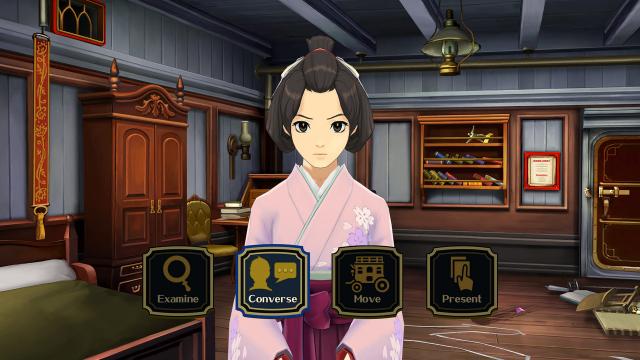
So the story is, as par for the course with Ace Attorney, handled very well. But even a visual novel has to confront gameplay at some point, and this has always been the series’ biggest bugaboo. Ace Attorney has always been plagued by the same problem, which is that the required way to present evidence to progress the game is very rarely the only logical one. The second game in particular is particularly bad about this, with numerous instances where it seems entirely reasonable that any number of pieces of evidence could be presented, but only one is the actual choice for progression that the writers created.
There’s also what feels like poor planning of what the developers will or won’t count as the “correct evidence.” Occasionally, there will be multiple pieces of evidence that essentially identify the same answer, but only one counts, which can lead the player to suspect that their initial idea was wrong while actually having been right all the time. As an example, one of the most egregious instances for me occurred when I was asked to indicate where an individual could have fallen from. I opted to present a picture of a particular tower, whereupon I was told I was wrong, only for the right answer to turn out to be a diagram of the exact same tower.
And this comes off as frustrating because of how this series handles fail states. Great Ace Attorney brings back the usual penalty system, where during trial segments the player starts off with five “health points.” Every piece of wrong evidence submitted during a cross examination or question answered incorrectly docks one point, so five mistakes equals a game over. This almost guarantees that the player is going to receive at least a few game overs due to no fault of their own. For all of the installments in the franchise, this series really hasn’t gotten any better at addressing this issue. I’m not sure if it’s really difficult to write cases so that there’s only one realistic question that can be answered at one time or something, but this continues to be the proverbial dead rat on the otherwise delicious plate of fish and chips.
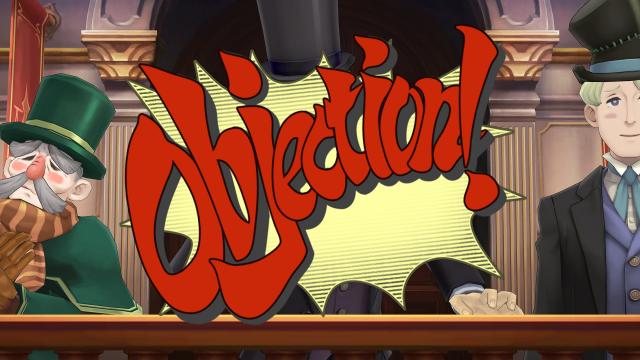
I suppose that’s part and parcel for the series at this point, so let’s look at what’s new. While Ace Attorney’s core gameplay has never really notably evolved since the first installment, there are always some token efforts to mix things up between releases. From Justice for All’s Magatama, to Apollo Justice’s Bracelet, and Dual Destinies’ Mood Matrix, these segments have tried (with mixed results) to add some variety to the standard investigation/trial gameplay loop. Great Ace Attorney follows this trend with a couple of new additions, those being the Summation Examination and the Dance of Deduction.
The Summation Examination plays off one of the more notable story twists for Great Ace Attorney when compared with its predecessors. For most of the Great Ace Attorney, the court has a jury that renders verdicts, rather than the singular judge who would rule by himself in Ace Attorney releases set in the modern day. Apparently, however, the writing team at Capcom has only ever vaguely heard of the concept of juries through court dramas or the likes, because the jury in these games operates in the most nonsensical way imaginable. At any point in the trial, if all six members of the jury feel convinced the defendant is guilty, they can cast their votes and end the trial, regardless of whether the defense has had time to present counter arguments or not.
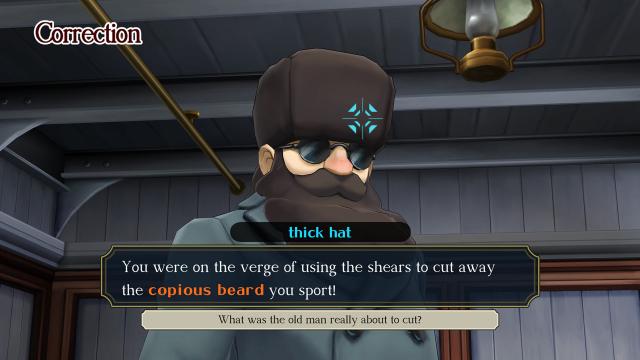
This is where the Summation Examination comes into play. At various points during the trial segments, the jury will rule the defendant guilty. At this point, the player is called upon to perform a Summation Examination, at which point each juror will state the reasons they’ve found the defendant guilty. The player is then tasked with pointing out conflicting statements, which will then often convince the jurors in question to flip their leaning. The limited number of statements on display almost always makes it pretty easy to get through these segments without a scratch, and they’re more of an annoying roadblock holding you up from getting back to actually solving the case rather than a fun diversion.
They’re also particularly nonsensical from a story standpoint and arguably one of the worst aspects of an otherwise very solid narrative. I could appreciate this sort of thing being included at the very end of the trial, but the jury frequently votes to convict the defendant well before the protagonist has had a chance to make any sort of legitimate rebuttal. There’s one especially absurd instance where the story has the jury vote to convict the defendant before the prosecution even so much as presents an eyewitness. Great Ace Attorney pulls this stunt so much that it devalues it to the point of meaninglessness. The first time the jury interrupted the trial to announce they were all convinced of my client’s guilt, it definitely startled me, but by the fifth time it had happened I was more rolling my eyes and taking an “all right, let’s get this over with” approach to the following examination.
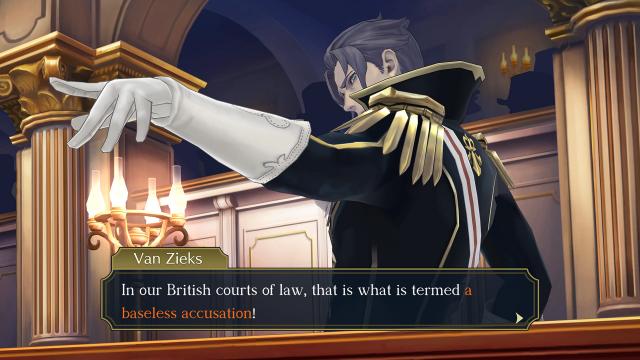
The Dance of Deduction, meanwhile, is infinitely better in that it’s simply boring rather than actively detrimental to the gameplay and story. This is Herlock Sholmes’ chance to shine; at various points during the investigation scenes, Sholmes will make a series of deductions that are often obviously off base. The player is then asked to “fix” his deductions by examining the surrounding area and choosing the correct object to substitute in for his mistaken observation. Again, though, it’s so easy to figure out that it doesn’t stimulate on any level, and after the first instance I just mostly found myself wanting to get them over with rather than enjoying the spectacle of Sholmes dancing around the room.
The main issue is that both of these just feel like distractions at best, and nuisances at worst. Ace Attorney really hasn’t figured out how to build on its formula; merely throw up a couple of shiny new toys that don’t so much evolve gameplay as add a few new hoops to jump through. For the next title, if innovation is on the cards again, something that actually builds on the usual investigation/trial gameplay rather than just existing alongside it needs to be done, because these new additions aren't carrying their weight
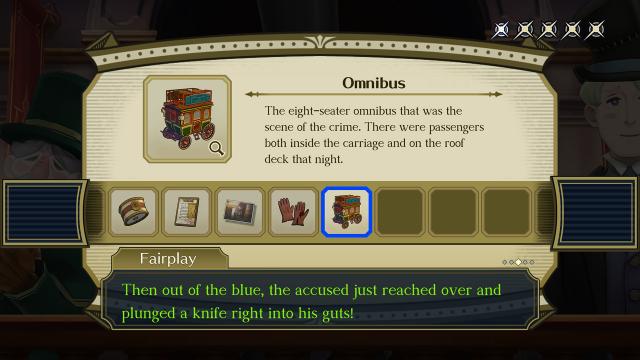
In keeping with prior entries in the series, the OST is exceptional. Yasamura Kitagawa and Hiromitsu Maeba have done a phenomenal job creating a selection of tracks that fit the themes and events of the games. If there’s one minor detail I would nitpick, it’s that it’s a little disappointing that the second game re-uses the same trial themes from the first one, whereas prior installments usually provided a new suite of trial music between titles. But perhaps that’s a conscious choice to emphasize that the two games are a singular saga.
One of the weirder additions is a “story” mode in which the game quite literally plays itself, in case your majesty is too busy to actually play the video game you spent $40 on. I supppose it’s entirely optional, so it doesn’t hurt anything, but it is a bizarre inclusion, and if you spent $40 on an interactive experience it seems odd to then take out the interactive component.
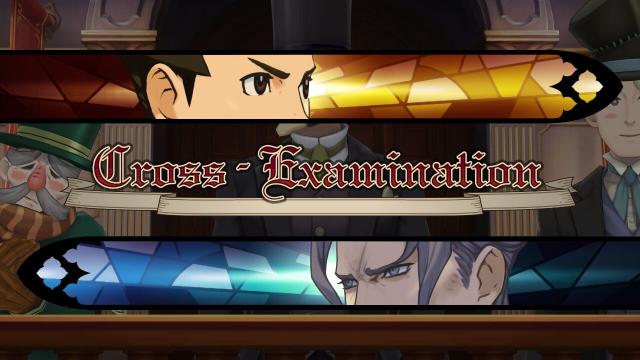
So that’s The Great Ace Attorney Chronicles, and I suspect how much you enjoy it will depend on what exactly you’re looking for in a game. If you’ve played prior Ace Attorney releases then you know largely what to expect; a stellar story, tons of charm, and gameplay that’s equal parts engaging and frustrating. For newcomers, this isn’t a bad spot to begin experiencing the series, although I’d personally still hold up the original trilogy as the high water mark for storytelling purposes. More than anything, I think I’m waiting for Ace Attorney to take the next step. Ace Attorney has already more than proven itself as one of the best narrative series in gaming, but sooner or later it needs to address the issues prevalent with its gameplay design.









